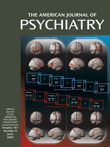Neuropsychological Dysfunction in Antipsychotic-Naive First-Episode Unipolar Psychotic Depression
Abstract
OBJECTIVE: The profile of neuropsychological impairment associated with unipolar psychotic depression remains unclear. The authors used a neuropsychological test battery to characterize the neuropsychiatric profile of patients with unipolar psychotic depression, relative to that of patients with nonpsychotic unipolar depression, patients with schizophrenia, and healthy comparison subjects. METHOD: Study subjects included antipsychotic-naive patients with a first episode of psychotic unipolar depression (N=20), antipsychotic-naive and unmedicated patients with nonpsychotic unipolar depression (N=14), antipsychotic-naive patients with first-episode schizophrenia (N=86), and healthy volunteers (N=81). Groups were matched on age, sex, race, education, parental socioeconomic status, and estimated premorbid intelligence. Psychotic patients were followed clinically for 2 years to confirm diagnosis. All participants completed a standard neuropsychological battery, including tests of general intelligence, executive function, attention, verbal memory, motor skills, and visual-spatial perception. RESULTS: Patients with psychotic depression had a pattern of neuropsychological dysfunction that was similar to but less severe than that of patients with schizophrenia. In contrast, patients with nonpsychotic unipolar depression had a neuropsychological profile that was similar to that of healthy individuals but that included mild dysfunction on tests of attention. Neuropsychological test performance was generally independent of acute clinical symptoms, but some pairwise group differences were attenuated by covariation for symptom severity. CONCLUSIONS: The similar neuropsychological profiles for schizophrenia and psychotic depression suggest that these psychotic disorders may have common pathophysiological features. The dramatic differences in performance between the patients with psychotic depression and those with nonpsychotic depression point to a marked distinction in neurocognitive function associated with the expression of psychosis in depressed patients.



